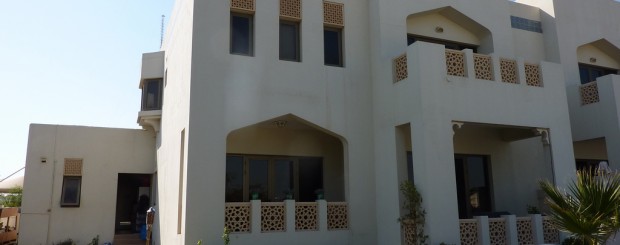Where To Start When Buying A House In Dubai
A quick glance at the Property for Sale section of the classified ads in the popular Dubai website Dubizzle.com shows that at time of writing, there were about 74,000 individual villas and apartments for sale in Dubai Emirate alone.
Plenty of choice, then, but what steps does a potential buyer in this very popular and sometimes volatile market need to take in order to get the right place for the right price without sleepless nights worrying over whether (s)he paid too much, or whether the contracts will be honored and the build quality is really as expected?
It’s not all that different from buying a property anywhere else in the world
We’ll assume that you, the buyer, have had all the usual discussions and conferences and have listened to the full spectrum of advice on the wisdom of buying as opposed to renting.
We’ll assume that after all this, buying still appears to offer sufficient attractions: stability, the possibility of medium to long-term capital gain, the nesting instinct satisfied, no longer being at the whim of landlords or the ups and downs of the rental market…
So first, you have to decide where you’d like to live, what you can afford, and how big a property your budget will allow. Villa or apartment? It all depends on your personal circumstances – are you married or single? Is this likely to change any time over the next three to five years? If already married, do you have dependent children? If yes, where are they going to attend school?
And then there are the real intangibles – how secure is your job? What are your prospects within your existing job or other positions within your general sector of expertise or employment?
Real estate agent, or private purchase direct from the owner
You may not have all that much choice. If you choose a number of properties from, say, the listings on Dubizzle, a fair proportion of them will be postings from real estate agencies.
But let’s just take a step back and look at what’s entailed if you follow either or both of these paths to ownership.
Negotiating to buy a house directly from the owner is like any other direct sale, only writ much larger. The old motto “caveat emptor” – buyer beware, certainly applies. Assuming you like what you see, you can then begin negotiating on a price.
Once this has been reached, the usual procedure is to sign a Memorandum of Understanding – a setting down in writing what both buyer and seller have agreed.
This will include such matters as price, settlement date, whether the sale is subject to an inspection by an engineer or a surveyor (highly recommended!), and whether the buyer is able to secure finance, if this is required, by an agreed date.
Despite sounding like an actual agreement to purchase, the Memorandum (usually referred to as an MOU) is not legally binding on either party. The property really only takes its first step to being yours when you pay a deposit – typically 10% of the total price – but be very sure before committing to this, as such deposits are non-refundable, if something goes wrong.
Finally, the property is legally yours when 100% of the price is paid and deeds to the property are registered in your name at the Dubai Land Department. I cannot emphasize strongly enough the need to get your Dubai lawyer involved in the process as soon as possible, preferably before the MOU stage (in fact, your lawyer will probably draft it for you).
The fees that you pay your lawyer to ensure that everything goes right are nothing compared to the costs and losses you could incur if you get involved in a sale without local legal assistance. A simple search using the keywords “Dubai lawyer” will give you plenty of hits, but start here.
Friends or colleagues who have been in Dubai for a while may be able to help you, but always remember the invaluable Expatwoman.com knowledge base. Here is a sample link on the subject.
It’s pretty much the same process if you are dealing with a real estate company. When it comes to making an offer, the sales agent will have standard sale forms for you and the vendor to sign.
In Dubai, the buyer pays the Real Estate Agent’s commission, so this is usually paid at the same time you pay the deposit on the property. Even though you are dealing through a sales professional, everything I said above about having your own lawyer onside still applies.
The money trail
If you are fortunate enough to have the full price of the property you intend to make your own, then no need to read this section. If however, you don’t, then you need to arrange financing, usually through a bank.
It goes without saying that you are in a stronger position if you have done as much of this part of the deal in advance as possible. In other words, once you decide that you are going to commit to buying a house or apartment in Dubai, before you even start looking, contact your sources of finance and make arrangements for the sum you are likely to require.
How difficult is this likely to be? I have no personal experience; I can only go on UAE banking practice before and after 2008 – the year of the big “slowdown.”
Prior to 2008, cold calling by bank personnel offering loans to customers was commonplace: the banks had a surplus of cash sitting idle and wanted to get it earning returns. Real estate is a far more secure bet than unsecured personal loans.
Between 2008 and recently, this cold-calling practice pretty much ceased, but now, in 2015 it has started again. The banks are obviously a lot more cautious now, even with “safe” loans on property. I am told that most require at least a 20% contribution from you and some will only loan as little as 50% of the total purchase price.
Offshore money? There are no particular difficulties having money transferred to Dubai banks. If you can get a better rate of interest from your homeland bank, then good luck, but it has been my experience that foreign banks are pretty wary about lending into volatile and distant real estate markets. Blame the overheated Dubai property market prior to 2008.
Are there any good stories about owning property in Dubai?
Yes there are! People who bravely bought off-the-plan houses and apartments in the early days – 2003 and thereafter – even though they had to wait a long time to see their properties complete, generally weathered the 2008 price crash pretty well.
People who just bought one property to live in themselves, even if they bought at the height of the market in 2007–2008 should, in the long term, be OK. Rents are rising again, and if your monthly mortgage outgoing is less than your monthly rent for a comparable property would be, then you’re better off.
People who bought between 2012 and 2013, before prices started rising again, should be quietly smiling – and people who kept their nerve and had the means to buy in the dark days of late 2008–2009 are probably very happy indeed with their purchases.








